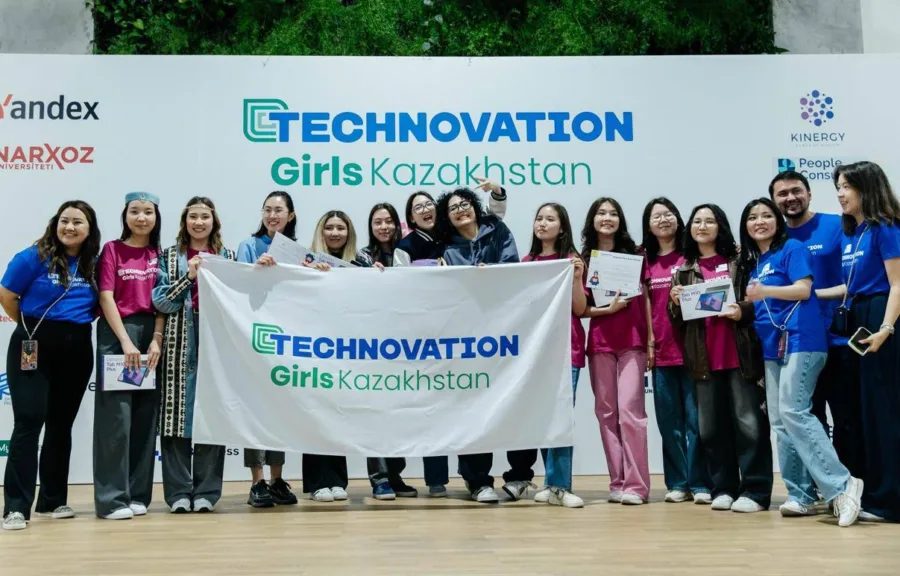Kazakhstan: Technovation inspires girls to lead change

In 2016, Diana Tsoy launched Technovation Girls Kazakhstan, a programme that empowers girls to pursue tech careers. Ten years on, she’s been speaking to some of the young women who have taken part in the programme about its life-changing impact.
Diana Tsoy is a John Smith Fellow (Kazakhstan, 2019) and founder of Kinergy Fund, an organisation she set up in 2022 to provide equal opportunities to young people in Kazakhstan in STEM fields (science, technology, engineering and maths).
Kinergy Fund grew out of a voluntary project which began six years earlier. In 2016, Diana and Dina Mukasheva, also a John Smith Fellow (Kazakhstan, 2018), connected with Technovation Girls. This global initiative, which empowers girls to create tech-based solutions to problems in their communities, inspired them to set up Technovation Girls Kazakhstan as volunteers. In the first year, just 50 girls took part.
Diana said, “Back in 2016, it was very unusual to see girls in IT. A lot of parents were concerned about what we were teaching the girls and why they should be there. We also heard of teachers discouraging girls from pursuing their interest in STEM subjects.”
Award-winning team
Just one year later, in 2017, the Kazakh team won an award at the Technovation global competition in San Francisco and was pictured with Sundar Pichai, the CEO of Google. “After this, the programme became really popular,” said Diana. “Today, around 2,000 girls apply each year to develop mobile apps and create actual solutions for social problems in the country.”
In 2019, Diana undertook her John Smith Trust fellowship. She says: “This experience was instrumental in launching the Kinergy Fund in 2022. Prior to that, both Dina and I were working as volunteers without a legal entity. After our fellowships, we decided to establish a fund, but had to postpone the launch due to the pandemic in 2020.
“The John Smith Trust gave us the confidence that we could do it. Through the fellowship, we realised that having a legal entity would help us grow. Looking back, I realise that only with the Fund we could keep Technovation Girls Kazakhstan growing. I’m so grateful to the John Smith Trust for helping us create a sustainable impact.”
Keeping in touch
Diana greatly values the opportunity to keep in touch with the John Smith Trust’s network of Fellows. “These are people who have done so much for their countries,” she said. “Learning their stories inspires me to keep going, especially when things get tough. I think very often, if they can do it, so can I.”
Diana also keeps in touch with former participants of Technovation Girls Kazakhstan through an alumni network of more than 3,500. Around 70% of the young women who have participated in the programme have gone on to pursue an education in the US, UK and Europe. Some have returned to Kazakhstan, while others are still studying or working abroad.
Diana has been conducting in-depth one-to-one interviews with former participants to find out more about how the programme has influenced their lives and careers over the last 10 years.
Let the boys be jealous
Ainur Aman took part in Technovation in 2017 and 2019. She told Diana: “My teacher at school told me: ‘For maths Olympics we take only boys.’ So, I decided: ‘I’ll join a programme for girls. Let the boys be jealous!
“We lacked resources and experience, but we had enthusiasm. And most of all, we supported each other. And that’s what saved us. When you finally complete a project outside the school curriculum, you don’t just add something to your portfolio for university. You know that anything is possible.”
Ainur has since gained a bachelor’s degree in electrical engineering from Budapest University of Technology and Economics. She is now working on a startup in Kazakhstan and is one of many former participants who have gone on to become mentors for younger girls taking part in the programme.
Giving back
Diana says: “The young women I talked with are all passionate about giving back. They participate as mentors, and they come back to us as judges and experts. Because they received something for free, they want to give back.
“Through these interviews, I’ve been able to see that this single experience of being part of a girls-only tech programme has empowered them so much. It made them feel like they were not this isolated, nerdy girl who was interested in coding, but part of a girls’ tribe who can make a difference.”
Roxalana Yesenbayeva, a participant in 2018 and 2019 and mentor in 2021, has recently graduated from St Louis University in the US, where she studied investment in real estate and accounting. She said: “Technovation was the first place where people believed in me, even before I fully believed in myself. It taught me that even in a world of fierce competition and capitalism, we still have the power – through creativity, care, and determination – not just to adapt, but to lead change.”
Do it while the fire burns
Ardana Izimova took part in Technovation in 2018 and is now a UPenn graduate, working in New York in an AI startup as a marketing and customer success specialist.
“Technovation became the first project in my life that was truly mine,” she said. “In Kazakhstan, there are no fewer opportunities than in America. There are many interesting projects, amazing people and ideas. But here I had the chance to grow as a person. It was uncomfortable, scary. And that’s what pushed me forward.
“If I could say something to those at the start – those who are searching, afraid, hesitating – I wouldn’t give advice. Mistakes are needed, choices are inevitable, growth is always personal. But there’s one thing I would leave them with, simple and honest: ‘Don’t waste time. Do it while the fire burns. Because in that fire your wings are born.’”
Find out more about our fellowship programmes
